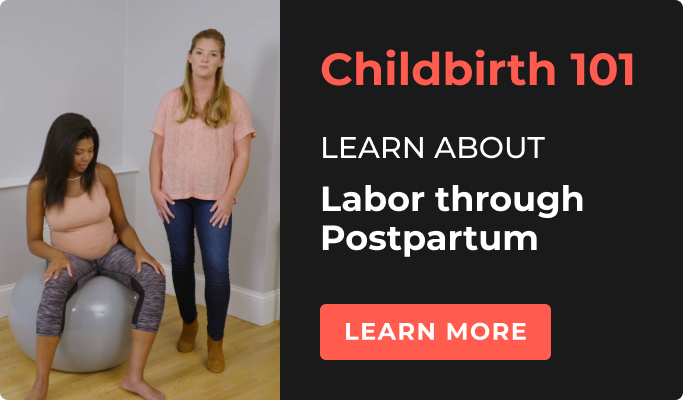Having a baby is an enormous event, involving so much preparation. Your body has been changing for nine months. You've been mentally preparing, perhaps with classes or reading. You've likely begun to arrange the baby's space and clothes and toys. But, how can you prepare for the emotional weight of this huge experience?
Welcoming a baby is exciting, but with all of the many transitions involved, your feelings might be more complex than you anticipate. This is a brand new job! If this is your first baby, you’ve never been a parent before and you’re still learning the ropes, developing the skills required for the role. At the same time, you’re also meeting a new person. You may not immediately understand what your baby needs or wants, their own personal rhythms and preferences. As with any new relationship, it takes time to get to know someone.
Lisa B remembers the self-doubt that can come with all of these changes:
"I felt like I had no idea what I was doing with everything and refused to listen to my gut or trust my instincts. I felt like there just had to be a ‘right’ or perfect way to do everything and was hell bent on following every book out there. After about three months that all improved and I started getting into the swing of things but those first few months were rough."
She’s not alone. Between the pressure to do things the “right” way, exhaustion, disrupted routines, and physical healing, the time after birth can feel completely overwhelming.
It’s not unusual to experience a rollercoaster of emotions, or “baby blues”- sudden spots of sadness or feeling overwhelmed as your hormones fluctuate and you adjust to your life with a new baby. These ups and downs are typically interspersed with feelings of happiness and joy and are totally normal. While the vast majority (80 to 90%) of new parents who have given birth experience emotional fluctuations, some factors can exacerbate these feelings.
Perhaps your birth experience wasn’t what you’d expected. Maybe you didn’t bond with your baby right away, or you had breastfeeding difficulties, your body feels unfamiliar as it heals, or you still have some complex emotions as a result of a complicated journey to parenthood. Maybe you are feeling the weight of the cumulative impact of racism, financial constraints, or previous traumas in your life. So many things can make this time of adjustment feel a little worse.
Morgan C had this struggle:
“I did not feel an immediate connection/bonding with my baby which, coupled with her having a hard time latching, led to extreme fatigue and sadness at the outset.”
During this stretch, it can feel as though there’s a “correct” way to feel, that you should have the expected emotions of joy and excitement. But reality is so much more complex, so much messier, and pressure to have specific emotions (and guilt over not having them) can become a terrible cycle.
For some parents, feelings of sadness that persist and worsen aren’t just baby blues, but can indicate a perinatal mood or anxiety disorder (PMAD). A PMAD can be more than just postpartum depression. Some people experience anxiety, obsessive symptoms or other emotional complications.
Sarah F wasn’t aware PMADs could manifest as anxiety.
“I didn’t even know that what I was feeling was actually a postpartum problem. I felt so nervous that I was going to accidentally hurt the baby, my anxiety completely took over my life.”
Susan K’s physical recovery, lack of sleep, and anxiety all coalesced.
“With my first baby, I was physically exhausted from about twenty-four hours of labor and five hours of pushing, and took a long time to recover from the exertion and the epidural. I was anxious all the time, was not sleeping even when I had the chance to, and was formally diagnosed with postpartum anxiety disorder about four weeks after the birth. It was the hardest time of my life.“
Is it baby blues or postpartum depression?
So how can you tell? It can be tough to untangle if what you’re experiencing is simply baby blues, or something more. Baby blues occur during the two to three weeks after birth, are transient, interspersed with feelings of joy, and they eventually go away on their own.
If you have symptoms that are more severe and persistent or are still happening after three weeks postpartum, it’s a good idea to contact your healthcare provider and explore the options available to you, including talk therapy, psychiatric medication, and support groups. Your prenatal and postpartum visits are a great time to be open about any difficulties you may be experiencing. But, if you don't have an upcoming appointment, you can call your provider and they can help connect you with more support. Here are some signs of postpartum depression to be aware of and to share with your community so that they, also, can be vigilant in caring for you:
• Sadness, crying, feeling hopeless or like things will never get better
• Anger, rage, low frustration tolerance
• Agitation or irritability
• Change in appetite
• Consistent inability to sleep when you have the chance to sleep
• Persistent, overwhelming anxiety or worries, particularly around the baby's wellbeing
• Loss of focus, difficulty concentrating
• Intrusive or scary thoughts
• Feeling alone, disconnected, or isolated
• Feeling guilt, shame, or hopelessness
• Indifference or numbness
• Loss of interest in things you used to enjoy
• Lack of interest or fear of being left alone with the baby
• Panic, or feeling like you want to jump out of your skin
• Negative thoughts or aversion to the baby
• Possible thoughts of harming the baby or yourself
Depression affects everyone differently, and postpartum emotional complications can manifest in many ways that aren’t strictly depressed feelings.
Lauren R’s experience didn’t fit what she expected a postpartum mood disorder to be.
“There wasn't any joy or elation. I felt so disconnected from my new infant and even felt that I somehow ruined my oldest's life. When I looked back on journals I kept, I recognized that this was postpartum depression, but no one told me that's what it was at the time. I just felt like a bad parent—and my partner didn't understand it either—so I was isolated, confused, and devastated.”
If you’re experiencing any feelings that are difficult or disruptive, reach out to your healthcare provider. There’s no reason to feel guilt or shame about needing help. As many as one in five birthing people experience a PMAD (either during pregnancy or within the first year after), making PMADs the most common complication of childbirth. PMADs can happen to anyone, it’s never a reflection on your abilities as a parent, and isn’t a result of something you did or didn’t do. Experiencing emotional adjustments with a new baby is normal, but the life-disrupting difficulty of PMADs is not, and you don’t have to struggle alone.
How to prepare for postpartum emotions
A new baby will upend your normal routines, making it hard to find time just to meet your own basic needs. But caring for your mental health requires caring for your overall wellness, so it’s a good idea to plan ahead if at all possible. Create a plan for making sure you’re eating, you’re spending some time outside, and perhaps the hardest part: you’re able to sleep. Sleep may seem impossible during these early weeks, but if you are able to, consider the options of hiring a postpartum doula, asking a relative to stay, or creating an arrangement for taking shifts with your partner.
Prepare yourself to accept help, and also offer yourself compassion. It can be easy to get hung up on feeling certain expected emotions, or experiencing motherhood the “right” way. Some parents bond immediately with their babies, others take a little longer. Neither experience is indicative of how much that parent loves their baby, or whether or not they’re a good parent. Sometimes you may want time away from your baby, a break from the relentless feeding and cleaning and comforting. That’s okay. It’s normal and healthy to feel a full range of complicated human emotions, even if they’re not what you expect. Be compassionate, patient, and gentle with yourself.
If you’re at a higher risk of PMADs, it can be helpful to seek out professional support in advance, especially a provider who is trained in treating pregnant and postpartum people. Here are some examples of risk factors:
• History of mood or anxiety disorders (such as depression, anxiety, OCD, bipolar disorder, eating disorders), especially within the perinatal period — either for yourself or in your family
• History of substance use or addiction
• Trauma, such as previous sexual assault, trauma in your family growing up, history of abuse, intimnate partner violence
• Relational stressors, such as lack of partner support, interpersonal violence, social isolation
• Traumatic birth, or being a near-miss survivor
• Complications with pregnancy, such as infertility treatmentments, history of miscarriage(s) or loss(es)
• Challenges or pain with breastfeeding
• Recent life stressor: a move, a job change, a death of a loved one
• Psychosocial stressors such as racism, discrimination, financial stress
• Birthing parent
• Having an infant in the NICU or an infant with medical complications or special needs
• History of endocrine issues, such as thyroid issues or diabetes
• History of Premenstrual Dysphoric Disorder or significant reactions to hormonal fluctuations
• Higher stress parenting, such as being a single parent, a teen parent, a parent of multiples
Having these risk factors doesn’t mean you’ll definitely develop a PMAD, but it can be helpful to understand factors that may increase your risk so that you can plan for what support would be helpful. Knowledge is power, and there’s no harm in finding a provider and beginning a discussion. There are loads of options available to care for your mental health, and it’s great to begin exploring them early. The more support you have, the better prepared you will be.
Whether you experience the moodiness of baby blues, or the more intense symptoms of a PMAD, it can help to know what to expect and how to prepare. For more information about labor, birth, and postpartum care, check out Childbirth 101: From Labor through Postpartum.
More resources
Postpartum Support International
Office on Women’s Health
Center for Women’s Mental Health
The Motherhood Center
About our Expert
Divya Kumar is a psychotherapist specializing in perinatal mental health and trauma. She is Co-Founder of the Perinatal Mental Health Alliance for Women of Color, a program within Postpartum Support International that increases perinatal support for communities of color. She lives in Jamaica Plain, MA with her husband and two children.




